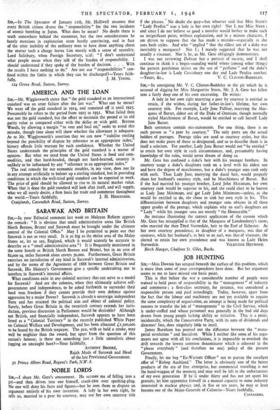AMERICA AND THE LOAN
Sm,—Mr. Wigglesworth states that " the gold standard as an international standard was an utter failure after the last war." What can he mean? We went off the gold standard in 1914, and remained off it until 1925. Presumably he refers to the period from 1925 to 1931. What failed then was not the gold standard, but the effort to maintain the pound at its old parity value as compared either with the dollar or with gold. Bretton Woods, by allowing a margin " to veer and haul on," seeks to avoid this mistake, though time alone will show whether the allowance is adequate. As to Mr. Wigglesworth's assertion that we can now " stabilise sterling beyond the possibility of dispute by reference to an appropriate index," history affords little warrant for such confidence. Whether the United States understands the principles of the gold standard is a matter of opinion: But what we need from the United States is food and com- modities, and that hard-headed, though not hard-hearted, country is unlikely to be influenced by any " reference to an appropriate index." The real remedy for our economic troubles, in my view, does not lie in any attempt artificially to bolster up a sterling standard, but in providing conditions in which the well-tried gold standard can be expected to work. The price of gold should be allowed to rise to its natural market value. When that is done the gold standard will look after itself, and will supply, what we all surely desire, a firm basis for trade and commerce throughout
the world.—Yours faithfully, J. H. HIGGINSON. Craiglands, Cavendish Road, Sutton, Surrey.


























 Previous page
Previous page